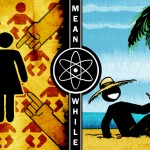Each Friday in Not Fit for Dinner, C. Ryan Knight explores political issues and the preconceptions guiding our understanding of and responses to them.
Two weeks ago in my column Placing #ObamaInHistory, I sought to dismiss exaggerated criticism of the president over modifications to the White House presidential biographies. This week, a technological blooper—the misspelling of America in the “With Mitt” iPhone campaign app by Mitt Romney’s campaign staff—compels me, for the present, to defend Romney.
The misspelled message “A Better Amercia” appeared alongside other correctly spelled campaign phrases like “We’re with Mitt” and “American greatness.” Romney’s campaign staff quickly fixed the typo, though Romney continues to get grief over the mistake: memes designed as campaign posters, a Tumblr account, and scores of tweets with the hash-tag #amercia. Stephen Colbert suggested this would work out in Romney’s favor when China tries to but cannot collect debt from a country (America) that no longer exists—and can’t forward the bill to the new country (“Amercia”) that replaced its predecessor.
The mistake is properly viewed as a “reminder to double-check your work,” but far too much could easily be read into the Romney campaign’s blunder. We could, for instance, potentially draw some of the following hypothetical conclusions from the mistake:
- The America Romney hopes to represent as President is fundamentally not America itself. Instead, he wants an America that favors the rich like himself, while further disenfranchising middle- and lower-class Americans.
- Romney is aware that Obama will outperform him in campaigning via social media, and this misspelling signifies his inability to properly utilize modern technology—and therefore, his failure to reach crucial voters he needs to win the 2012 election.
- The misspelling stenciled overtop pictures of important American buildings and figures indicates that Romney will damage the very things he claims he wants to help or preserve if he is elected.
- Romney’s staff is bound to write erroneous cables, speeches, and more on Romney’s behalf if they cannot even manage to correctly spell the name of their own country—a name more difficult than France or Spain, but far easier than Azerbaijan or Uzbekistan.
We can argue about the veracity of these four hypothetical claims. Yet the central point here is that we cannot forget that most mistakes and bloopers that surface during things like presidential campaigns do not supply sufficient reason to dismiss or discredit a politician and her or his platform. To dismiss a candidate as misguided or inadequate, it’s imperative that we examine that person’s platform, along with his or her past political record, and decide from there. Stories like #ObamaInHistory and #Amercia are interesting (and funny, to some extent), but they do not—or should not be allowed to—carry serious weight in political campaigns. (I must note that far more seriousness has been assigned—wrongly—to Obama’s modifications of biographies than to Romney’s misspelling of America.)
I do not wish to be seen as a killjoy here. I don’t mind (and enjoy reading) trending tweets about #ObamaInHistory or #Amercia, so long as they aren’t taken seriously. But I fear that far too many people, consciously or subconsciously, place too much faith in these minor and fleeting issues. We must be able to distinguish fleeting issues, which flash in the pan, and substantive issues requiring our attention as American citizens.
Christians should be particularly concerned about whether or not they can distinguish between fleeting and substantive issues. If they cannot, it seems all the less likely that they can distinguish the temporal and the earthly from the eternal and the heavenly.











